The Best Leadership Links to Read Right Now
Get Your Motivation Mojo Back |
For many, mustering the requisite motivation to take crucial action at work and in life is difficult right now—whether it’s from pervasive pandemic burnout or a more muted feeling of languishing. Whatever it is that’s impeding your mojo, this smart New York Times piece on motivation has tips that can help. The key is to tap into tools that can facilitate “autonomous motivation,” which is “self-directed,” as opposed to “controlled motivation,” which flows from feeling under siege by demanding “outside forces.” Recommended tips include giving yourself small rewards to accompany tasks, finding your “why,” pursuing social connection, treating yourself with self-compassion, and more.
Fixing the Modern Workplace
Since March 2020, companies have been adapting to COVID-19 with drastic overhauls to the way people work and where they perform their jobs. Many were hopeful this forced, radical re-imagining of work would obliterate some of the hallmarks of toxic workplace culture like burnout from overwork, authority bias which tamps down dissent, and more. But this interesting BBC Worklife piece explores the troubling “evidence that harmful pre-pandemic ways have simply been adapted for the remote world.” Some red flags include the rise in bosses using surveillance software to spy on remote employees, people working even more hours from home than they were in their offices, and work-related pressures causing mental health issues. The missing ingredient that could ameliorate all these workplace woes? Trust. Find tips for cultivating trust in your organization in the full article here.
**For more on this, read our tips from 3 top leadership experts for building trust post-pandemic.
“As we enter a transitional stage after a year of trauma and strain, more than ever we need ways to refresh our energies, calm our anxieties, and nurse our well-being,” write the authors of this Harvard Business Review post on a surprising piece of the wellness-at-work puzzle: awe. One way to harness a feeling of wonder that can aid in resilience, productivity, and stress reduction is to consciously cultivate “experiences of awe” with your team. Awe’s power comes from its “element of vastness that makes us feel small,” which can “decrease mental chatter,” and “improve creativity and collaboration.” The article has tips for creating and harnessing your own awe—both for individuals and for leaders and teams—here.
“When we talk about increasing productivity, we’re really talking about increasing output,” explains this Atlassian piece on outdated ways of measuring productivity. The problem with focusing on output as the primary metric of productivity is that “more output doesn’t necessarily mean better results.” While output is a great way to “measure the impact of machines and capital,” it’s not an effective “way to measure the impact of humans.” To implement a people-centered mode of measurement, it’s important to “emphasize outcomes over outputs,” and the full piece has a wealth of actionable tips for doing so here.
Although the way people experience the chest-tightening sensation of “pressure” may be vast and diverse, research outlined in this Smith Business Insight article reveals it is primarily a function of three things: “The importance of a situation’s outcome; the uncertainty of the outcome; the volume of tasks, decisions, and distractions surrounding the situation.” Each component of pressure has the potential to derail you but also possesses great potential to energize you. Tapping into the positive potential of pressure requires knowing how to navigate these key tensions of “importance, uncertainty, and volume,” and there are itemized tips for managing all three in the full post here.
Rewriting the ‘Story about Business’
Stakeholder capitalism—a belief that businesses must serve all of their stakeholders, not only their shareholders, to achieve long-term success—has achieved popular “momentum beyond a tipping point,” but still faces some challenges, according to this Just Capital interview with one of the foundational thinkers who innovated the idea over 30 years ago. One roadblock to a complete paradigm shift around stakeholder capitalism is that people are in the “grip of an old story,” and “can’t imagine business as anything but a duality between stakeholders and shareholders,” when really the two are not at odds, but are intrinsically connected. This needs to be reflected in the business model itself, which requires “understanding how business actually works,” and fundamentally changing the “story about business” and its societal role. Unlock all the insights in the full interview here.
Respect Is the Secret to Resilient Employees
Of all the creative job perks employers have cooked up over the past decade to earn loyalty from their workforce—from free sushi to pool tables to fully stocked bars—it turns out the most effective way to engage and retain talent is to treat them with respect, shows this coverage in the British Psychological Society Research Digest. Some of the positive results should hardly be surprising: “Being valued and respected by managers was the key factor in employees’ ability to positively adapt to the workplace,” and “impacted how loyal workers were to their employers, how much they engaged in their work, and how happy they felt overall.” But one finding shows that respect goes beyond employees’ job satisfaction and extends into how they deal with challenges and persevere: “Those who felt they were respected and valued both by colleagues and by bosses were more likely to experience occupational resilience,” and to ultimately, “stay employed at their company.” Explore the full post here.
**For more on respect, check out our 4 powerful ways to value people beyond saying ‘thank you.’
“Increasingly, ordinary people, customers, employees, suppliers, and even social media influencers expect leaders to speak out and act ethically, and immediately, when it comes to issues of justice and equity in their organizations—and in society at large,” says this strategy+business explainer on how to navigate societal issues as a leader. A wide array of diverse stakeholders will demand different responses to the issues of the day and CEOs must be sensitive to the nuance and to take responsibility: “These emerging leadership challenges cannot be delegated or outsourced if companies are to build and retain stakeholder trust,” and “require a fundamental shift in how business leaders understand and practice ethical leadership.” Now, it’s a business imperative that leaders know how to “engage with these issues,” and CEOs, “rather than being heroes or charismatic leaders, have to become ‘moral integrators’: people who recognize this tension and have the self-awareness to use collaboration and listening skills to navigate a world in which accountability is defined in different ways by different audiences.” Learn how to become a ‘moral integrator’ in the full article here.
Insights & Resources from ConantLeadership
A bi-annual FREE meeting of the top leadership minds and luminaries in the business space. Hear from Jane Hyun, Dan Pink, Hubert Joly, Amy Edmondson, and more.
RSVP: https://start.conantleadership.com/blueprint-leadership-summit/
Doug Conant Talks ‘Leading with Integrity’ on The Knowledge Project Podcast
Leadership AssessmentTake our FREE leadership competence quiz and learn how you stack up on the ‘3Qs’—Leadership FQ (Functional Intelligence); Leadership IQ (Intellectual Intelligence); and Leadership EQ (Emotional Intelligence). Quiz: https://start.conantleadership.com/leadership-assessment/ |
Performance & Purpose Are Self-Reinforcing’: Indra Nooyi & Doug Conant on How to Be a Transformational Leader |
In this new ConantLeadership post, Indra Nooyi and Doug Conant share experience-backed wisdom and practical tips for becoming a highly effective transformational leader.
The Only Way Out Is in: Bill George & Doug Conant on Leading Authentically |
In this ConantLeadership post, two revered leadership luminaries and former Fortune 500 CEOs offer expert tips for leading more authentically and finding ‘true north’ in times of tumult and crisis.
How to Build Trust Post-Pandemic
This ConantLeadership post compiles advice from three top leadership experts for building and strengthening trust with your stakeholders in a post-pandemic world—including telling your people how much you care, and then showing it tangibly and repeatedly.
July’s Leadership That Works Newsletter
In last month’s newsletter: Fix your ‘digital body language,’ oil your ‘squeaky wheels,’ put health on the CEO agenda, and more.
|
Join us at the next BLUEPRINT Boot Camp by ConantLeadership, a 2-day leadership intensive which offers elite-level, highly interactive training with a community of your leadership peers. This engaging and immersive leadership development experience is centered around a structured 6-step process for reflection and learning that empowers you to lead like only you can. Apply now for our November 2021 program: conantleadership.com/bootcamp |
(Cover Photo by Rich Smith on Unsplash)

“Doug Conant is remarkable—and so is this work.“
– Stephen M. R. Covey
Author of The Speed of Trust
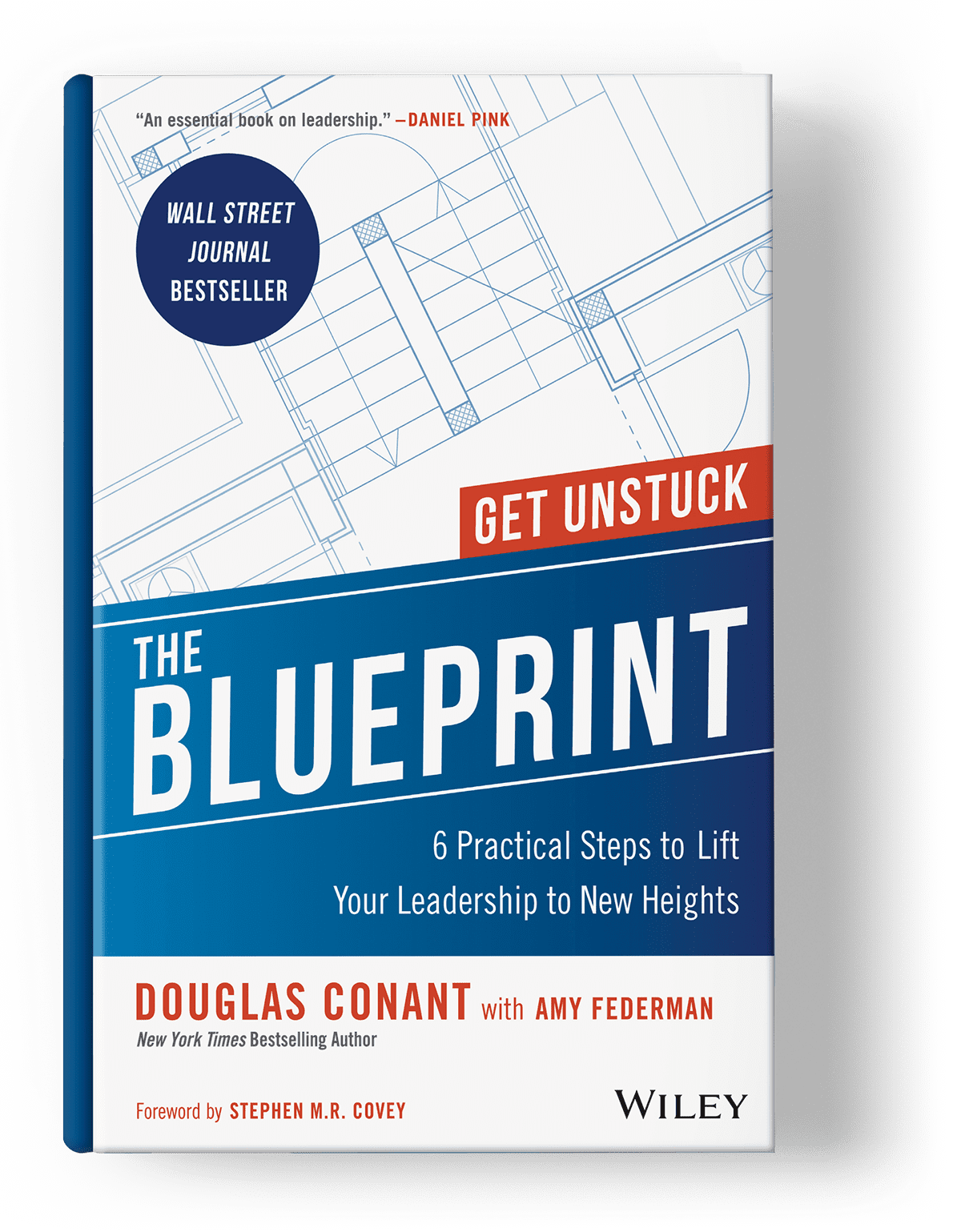
The Blueprint
6 Practical Steps to Lift Your Leadership to New Heights
By Douglas Conant with Amy Federman

Have Doug Speak at Your Event
Doug works collaboratively with event organizers to customize his material for each audience.

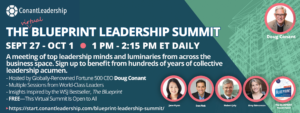
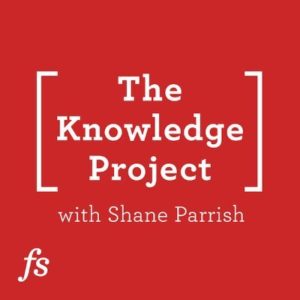
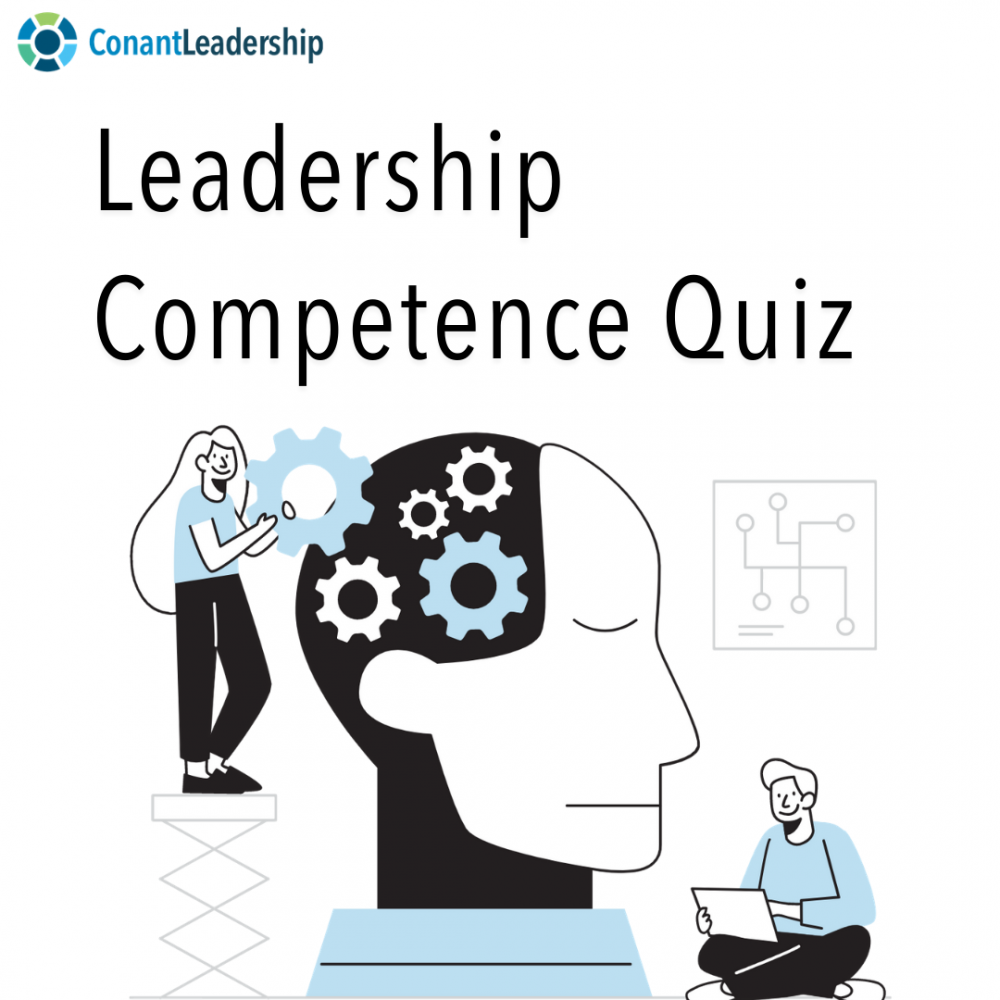
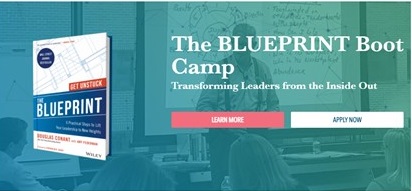
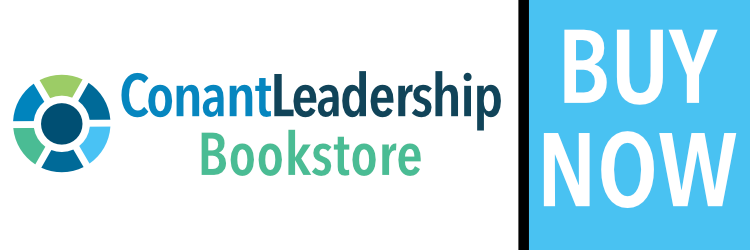

0 Comments